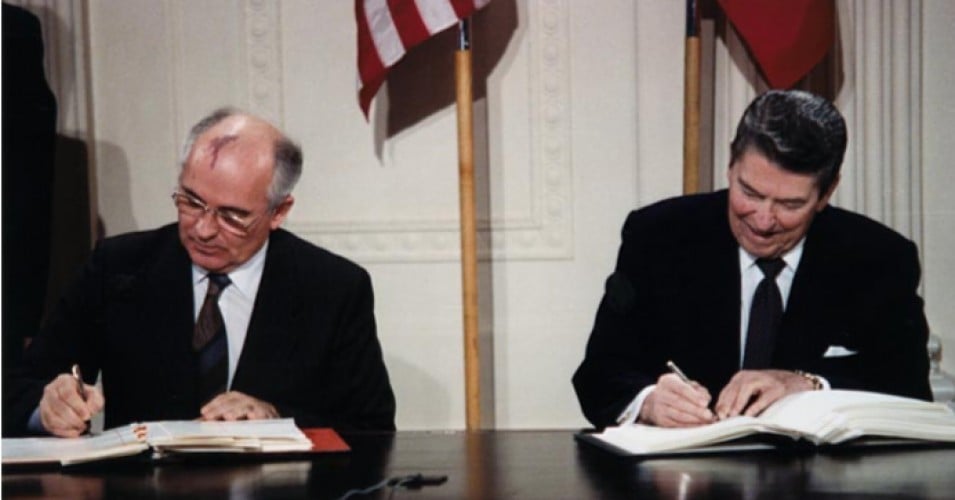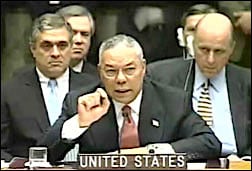History of US-NATO Military Campaigns (1991-2023)

Speech presented to the Conference, “Is our future NATO?”, organized by Abbasso la Guerra Group.
Before tackling the story of the military campaigns that have haunted our last thirty years up to today, it is necessary to recall three facts about the origin of these wars.
In 1944, seventy-four Nazi leaders were aware of the defeat of Germany but determined to save the Nazi ideal from the catastrophe, they founded the organization O.D.SS.A. Their intent was to emigrate, and to any state where they establish, engage in companies, administrations, and political parties at any level, and filter their Nazi thought. Many of them were absorbed into the US services for their experience of the Soviet Union and placed in the departments of various agencies. Their vision has undoubtedly influenced American politics crosswise.
 In 1977 a group of liberal intellectuals, the future neo-conservatives, including characters who would later take part in President Bush jr.’s Administration such as Paul Wolfowitz, Dick Cheney, Donald Rumsfeld, and Jeb Bush or philosopher Francis Fukuyama, conceived a project that shares many ideological traits with O.D.SS.A:
In 1977 a group of liberal intellectuals, the future neo-conservatives, including characters who would later take part in President Bush jr.’s Administration such as Paul Wolfowitz, Dick Cheney, Donald Rumsfeld, and Jeb Bush or philosopher Francis Fukuyama, conceived a project that shares many ideological traits with O.D.SS.A:
“The history of the 20th century should have taught us that it is important to shape circumstances before crises emerge and to deal with threats before they become tragic…
The history of this century should have taught us to embrace the cause of American leadership…. establish a strategic military presence worldwide through a military technological revolution, deter the emergence of any competitive superpower, launch pre-emptive strikes against any power that threatens American interests.”
These are the guidelines of the PNAC (Project for a New American Century). The founders of the project will later reveal to be linked to the oil and arms industries, then to the Industrial-Military Complex which, at the end of Gen. Eisenhower’s Presidency, had assumed such power as to influence the policy of any government and President in charge.
Former Soviet leader Mikhail Gorbachev and U.S. President Ronald Reagan signed a landmark nuclear arms control treaty in 1987. (Photo: White House Photographic Office/National Archives and Records Administration)
The last key date is December 8, 1987, when President Ronald Reagan and USSR President Mikhail Gorbachev signed the INF Treaty (Intermediate-Range Nuclear Forces Treaty). It was an important phase, a new period, the end of the cold war and the opening of the Iron Curtain. Gorbachev was reassured: NATO will never reach Russian borders. And he was awarded the Nobel Peace Prize. The world breathed a sigh of relief but it was just a long illusory pause.
The United States was the only world power and intended to exploit the situation and realize the blueprint for its New Century.
In fact, the US was preparing to attack independent Iraq, too rich in oil and with an evolved population. (In 1989 the value of the dinar against the dollar was 1IQD at $1,365.)
Post Cold War Conquests. Iraq and Yugoslavia
On November 5, 1990, the American Congress approved law 101-513 on foreign operations and appropriations which not only foresaw the cost of the attack on Iraq, but also the end of Yugoslavia. A section of the law provided for the cutting within six months of any aid, credit, or loan from the USA to Yugoslavia. Furthermore, free and separate elections were required in each of the six constituent republics, and both the procedures and the results of the elections should have obtained the approval of the State Department: only after these fulfilments could economical support have been reintroduced, but no longer to the central government, only against individual republics, and only if they were governed by “democratic” forces… Loans were granted to nationalist parties.
On December 26, 1991, the USSR dissolved, and the Warsaw Pact as well on July 1 of the same year. At this point the Atlantic Pact had no reason to exist, however in a meeting in Rome the previous November its Strategic Concept was changed, and NATO began to transform itself into what it is now: no longer a defensive but an offensive force according to the project of the American Century.
In 1991 the United States attacked Iraq in force with the support of 35 countries, some members of NATO, and other outsiders. The war stopped before reaching Baghdad. The result was tragic for Iraq which suffered enormous human losses, a heavy industrial and social retrocession as well as subsequent tragic sanctions. For the first time, the consequences of the use of depleted uranium bullets on soldiers were mentioned.
In that same year, the proceedings for the dissolution of Yugoslavia began. The reason can be found in the desire to deprive the USSR of any friendly shores, a path that will continue later toward Russia.
Yugoslavia was a founding war where a dress rehearsal was staged for the next wars, and where a series of strategies – I call them The PROTOCOL – were put into practice.
These are the directives:
- Independent and recalcitrant states and governments to US directives are prosecutable and must be folded.
- Organization of Coloured Springs to create riots among civilians in order to embarrass the government.
- Harsh sanctions on the targeted nations.
- The demonization of the antagonist is established through the media with heavy smear campaigns, especially centred on the leader.
- Far-right parties and people with Nazi or extremist leanings are approached to influence or take over governments.
- Extremist groups receive weapons and training.
- CIA agents are sent with a lot of cash to convince politicians, journalists, or prominent figures to support the imposed narrative.
- Use of bloody staging to blame the antagonist, and justify the intervention of NATO.
- Employment of Western agencies of mercenaries and groups of Nazi or jihadist extremists.
- Sabotage of any attempt at dialogue between the parties until the war exploitation plan is completed.
As per protocol, in 1990, intelligence agents began contacting Muslim extremist groups in Bosnia and far right Ushashi in Croatia.
This action was followed by elections in each individual Republic avoiding a Federal Referendum. At Christmas 1991 Germany, and in January 1992 the Vatican, followed by European countries, recognized the Republics of Croatia and Slovenia. It was more complicated in Bosnia Herzegovina, because 35% of the population formed by Serbs had not participated, but the result of the referendum was anyway recognized.
Civil war broke out in March 1992. At this point, the UN Peacekeepers were sent as an interposing force.
The war could have stopped in August of the same year when in Lisbon Jose Cutilliero proposed an agreement the representatives of the three ethnic groups Radovan Karadzic, Franjo Tudsman, and Aljia Izetbegovic accepted. Izetbegovic was recalled to Sarajevo and, after speaking with the US Ambassador Warren, rejected the peace plan.
A 1997 Congressional document produced by the Republican Party Committee reveals:
“The US Administration with the suggestion of Clinton’s National Security Council headed by Anthony Lake helped transform Bosnia into a militant Islamic base” leading to the recruitment of thousands of Mujahideen from the Islamic worlds. This policy was directly approved by President Clinton in April 1994 under pressure from CIA Director Anthony Lake and Ambassador Peter Galbraith.
The President authorized the arrival of aid from Iran to Sarajevo by means of the CIA, but along with weapons and medicines the Iranian secret services also arrived, and they will enormously influence Izetbegović’s politics. (See Michael Chossudovsky, Global Research, 2002)
According to the Los Angeles Times documents, this policy has been replicated in Kosovo.
I would like to recall the grenade on the bread line (1992) and the two bombs on the Markalé market (1994 and 1995) in Sarajevo. The massacres were immediately attributed to the Serbs, and the refusal to organize a commission of inquiry to establish responsibility for it authorized NATO to carpet bomb Republika Srpska for a month. (Mitterand, The Year of Farewell by Laure Adler- David Owen, Balkan Odyssey – Bosnia Tragedy, International Action Centre).
The war would continue for another 3 years until the Dayton Agreement that US lawyers drafted. The Western powers are desperately trying to cancel this treaty today facing the opposition of the Republika Srpska and the Croats of Herzegovina.
The Republika Srpska of Krajina (the denomination means border, frontier as Ukraine) was composed of three regions at the foot of Croatia and was “purified” of any Serbian presence in 1995 by the Croatian army supported by the Contractor Agency MPRI, a branch of the E-Communications Holding with the blessing of the Pentagon during Operation Flash and Operation Storm (May 1 and August 4, 1995) A fate similar to what could have been that of Donbas.
The project is increasingly clear: to remove any possible ally from Russia step by step and surround it with NATO. Despite Bush senior’s Government Secretary of State James Baker promised not to advance NATO Eastwards.
The 1999 War against Yugoslavia
After four years of relative tranquillity, in 1999 the Pentagon decided to bend Yugoslavia formed by Serbia and Montenegro by supporting the alleged rights of the Albanians of Kosovo Metohija, an ancient Serbian region.
As per protocol, a massacre of civilians at the Racak Pit in Kosovo is staged as an excuse to bring the parties together at Rambouillet Castle in France and force an occupation-like deal on the Serbs. When the Serbs refused, the US/NATO bombings began on March 24, 1999. NATO troops had already been deployed in Macedonia for a couple of months waiting to intervene. The bombings lasted 75 days, in the end, NATO will occupy Kosovo but not Yugoslavia thanks to Russian mediation.
On October 2000, a colour revolution takes place in Serbia and put an end to the government of Milosevic. A mysterious group of students called OTPOR, CANVAS today, orchestrated the demonstrations. This grouping will be a secret weapon and will be successfully employed in other European states.
The Wars on Afghanistan, Iraq and Libya
The Russians left Afghanistan after 10 years in 1989. A month after the fall of the New York towers in September 2001, President Bush Jr. and his Neo-cons ministers decide to attack Afghanistan guilty of having planned the tragedy according to them. The US will leave the country exactly 20 years later between August and September 2021.
Image: Tenet on left with Powell and U.N. ambassador John Negroponte at Security Council, Feb. 5, 2003. (Wikimedia)
In 2003 it was Iraq’s turn again, the excuse for the attack was the presence of chemical weapons which Gen. Colin Powell showed to the UN Assembly. This was a lie, but Iraq was invaded and Balkanized.
In the 10-year respite from the previous attack, the Oil for Food agreement was granted to help the population, and the profit derived from oil would be transformed into food and basic necessities. Saddam Hussein demanded that payment be made in euros, not dollars, and deposited at the Banque de Paris in France. The decision likely earned him a hanging.
US/NATO leave a trail of horrors and crimes that WikiLeaks has witnessed and reported. The United States will then intervene again in 2014 to strike possible Da’esh bases.
Libya was independent with a high level of growth. Colonel Gaddafi, its leader, did not intend to share oil with Western companies, on the contrary, he intended to use dollar deposits to mint a pan-African currency that would have annoyed the dollar and the CFA franc (the French currency imposed on the 14 former colonies).
The African Union summit on January 31, 2011, initiated the creation of the African Monetary Fund. It should have happened within the year. The plan was to create three financial bodies: the African Monetary Fund based in Cameroon, the Central Bank in Nigeria, and the Investment Bank in Tripoli. The purpose of these bodies was to create a Common African market.
The Secretary of State of the Obama government, Hilary Clinton, in agreement with French president Sarkozy (the exchange of messages between the two, published by WikiLeaks, proves it) decided to bomb the country.
They began with the discovery of a mass grave of 5,000 bodies, proof of the iniquity of the Leader, and on March 19, 2011, they attacked the country. Meanwhile, all of Libya’s deposits amounting to 150 billion dollars are seized by Western banks, a large part of this sum mysteriously evaporating. Gaddafi was brutally murdered. The country is in chaos, the population is impoverished, and the oil revenues are collected by power groups and multinationals. Persecuted and blackmailed African workers are victims of human traffickers. The country is in the hands of uncontrolled Islamic tribes and militias and is divided between the government of Tripoli which is protected by Westerners, and the government of Misrata.
The War on Syria
It’s Syria’s turn. Civil war broke out in Syria on March 15, 2011, thanks to the underground intervention of the organizers of the Arab Spring.
An official US document shows that Western countries, Turkey, and the Gulf States supported the opposition to establish a Salafist Principality in an eminently Sunni country.
In December 2012, the Secretary of State Hilary Clinton in a secret document (case n° F.204-20439 doc. n°5794498) spoke of a strategic relationship between Syria and Iran and suggested the overthrow of Bashar al Assad to favour Israel as the only nuclear power in the area.
In 2013 President Obama authorized a covert operation Timber Sycamore, financed by Riyad, through the CIA to arm, train and infiltrate suspected rebels in Syria, this news will be published by the New York Times on January 24, 2016. Of course, it could not miss a staging to officially intervene. Assad was accused of having used chemical weapons on some villages, ignoring that the delivery of these weapons had taken place in Gioia Tauro by the Danish ship Ark Futura on July 2, 2013 thanks to Russian mediation.
In September 2014, the US attacked with aviation and cruise missiles bombing twenty sites. In 1915 Russia, with an hour’s notice to the United States, launched the first attacks in the province of Homs, helping President Bashar al-Assad to maintain control of Western Syria.
The Russian intervention imposed another pace on the US/NATO attacks. Russia is currently carrying out mediation between Iran, Turkey, and Syria.
On July 19, 2022, in Tehran, they adopted a declaration on respecting the integrity of the Syrian territory and preventing any action intended to violate UN Security Council Resolution 2254.
A further meeting of the three parties in December 2022 in Moscow confirmed the need to stabilize the Arab Republic in the region.
Ukraine
It is the Ukraine’s turn. As NATO extended to Russian borders, Russia repeatedly requested Ukraine’s neutrality without getting a response. The United States focused on Ukraine. Azov Nazi groups are funded and trained, and a colour revolution is staged by the usual professionals. We know the cruelty of the Azov groups in Odessa and the intervention of mercenary snipers expressly sent to shoot at the crowd and police in Maidan Square.
After the events of Maidan Square in February 2014, and Ukraine’s independence declaration the Russian-speaking areas of Donbas separated declaring their own independence and suffered continuous bombings by Kiev.
In 2019 the Rand Corporation (the Pentagon Think Tank) suggested making Ukraine a permanent war ground to consume Russia’s forces and finances.
In 2022 Kiev deployed 150,000 men in front of the Donbas and accelerated the bombing. At this point, Russia intervened. Sweden and Finland abandoned their state of neutrality and applied to join NATO.
A pounding media campaign created a monster enemy: Vladimir Putin and Russia.
The situation takes on increasingly serious implications. Arms shipments by all NATO members effectively turn these countries into belligerents in an undeclared war, while the US is the mastermind of an operation involving Europe in a possible proxy WWIII.
Image is from InfoBrics
If the shipment of long-range missiles to Kiev is confirmed, it is possible that Russia will open a new front from Belarus.
It is also possible that NATO could open a new front in the Balkans, as well to obtain the closure of the Turkish Stream, the last remaining pipeline from Russia that supplies a series of countries up to Hungary and Austria.
Serbia is deliberately under pressure via Kosovo, and US and EU are asking the Serbian government to join the sanctions against Russia by threatening to block visas for Europe. Russia cannot lose the Balkans and has affirmed its willingness to react.
What still awaits us?
A front in Taiwan against China, in particular, if the project to mint a new currency with the BRICS (Brazil, Russia, India, China, and South Africa), to which Iran, Turkey, and Algeria have also recently asked to join in, is realised.
To conclude, the US/NATO forces have cleared corruption as a weapon of war, and wherever they have intervened to establish democracy they have left instability and misery.



